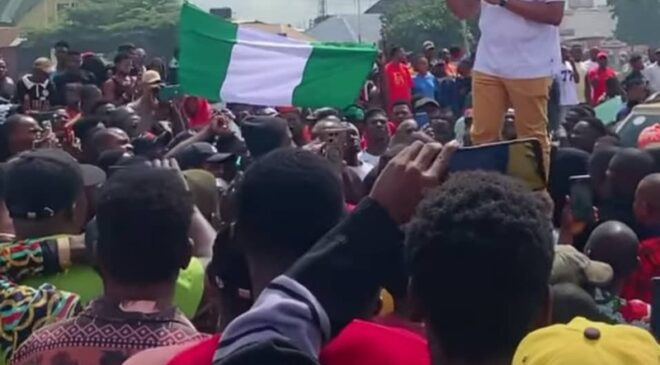“Good governance is the art of putting wise thoughts into prudent action in a way that advances the well-being of those governed.” — Diane Kalen-Sukra
The nationwide broadcast by President Bola Ahmed Tinubu, on August 4, 2024, addressed the ongoing #EndBadGovernanceInNigeria and #EndHunger protests. These protests, driven by the public’s demand for significant reforms and improvements in governance and socio-economic conditions, have highlighted the growing frustration among Nigerians.
In his speech, President Tinubu sought to address these concerns, but a critical analysis reveals that the speech fell short of meeting the protesters’ expectations and failed to offer substantial solutions to douse the tension.
The demands of the #EndBadGovernanceInNigeria movement are clear: accountability, electoral reforms, improved public services, security reforms, economic reforms, youth inclusion, and justice and human rights. On the other hand, the #EndHunger protests focus on food security, poverty reduction, affordable food prices, support for agriculture, social safety nets, and nutritional programs. These demands underscore the urgent need for systemic change to address the underlying issues plaguing the nation.

In his address, President Tinubu began by acknowledging the turmoil and violent protests, expressing his pain over the loss of lives and the destruction of property. He condemned the violence and looting that marred the protests, emphasizing the need to stop further bloodshed and destruction. However, his call for protesters to suspend their activities and engage in dialogue did not answer the core demands for transparency, accountability, and concrete action.
President Tinubu’s assertion that the government will not stand idly by while a few with a clear political agenda tear the nation apart appeared dismissive of the genuine grievances driving the protests. His speech lacked a detailed plan to address issues such as police brutality, electoral reforms, and economic disparities. The call for unity and collective effort to reshape Nigeria’s destiny, though well-intentioned, did not provide the immediate solutions the protesters sought. Nigerians, need answers to these issues.
In addressing the economic challenges, he highlighted his administration’s efforts to remove fuel subsidies and abolish multiple foreign exchange systems. He claimed these measures were necessary to reverse decades of economic mismanagement. However, while these actions may have long-term benefits, they have also exacerbated the current economic hardships faced by ordinary Nigerians. The speech did not offer immediate relief or tangible solutions to mitigate the rising cost of living and food insecurity, key issues driving the protests. Again, he has left Nigerians with a vague hope.
He also referred to the government’s strides in rebuilding the economy and increasing government revenues did not adequately address the protesters’ demands for improved public services and economic reforms. While he mentioned the reduction in debt service and the clearance of foreign exchange obligations, these achievements did not directly translate into improved living conditions for the average Nigerian. The speech failed to bridge the gap between macroeconomic progress and the daily struggles of the populace.

The president’s vision for a just and prosperous nation where peace, freedom, and meaningful livelihood prevail sounded idealistic but lacked concrete steps to achieve these goals. His emphasis on transparency and accountability in governance did not align with the protesters’ call for immediate action against corruption and mismanagement. The speech did not provide a roadmap for implementing the necessary reforms to ensure free, fair, and credible elections, a critical demand of the #EndBadGovernanceInNigeria movement.
His mention of various infrastructure projects, including roads, bridges, and railways, was a positive highlight. However, the speech did not sufficiently address the need for better healthcare, education, and other public services. The protesters’ demand for improved service delivery remains unmet, as the speech focused more on future projects rather than immediate improvements in these critical sectors.
In terms of security reforms, President Tinubu reiterated the government’s commitment to ensuring the full protection of lives and property. However, his speech did not address the specific issues of police brutality, kidnapping, and terrorism that have fueled the protests. The call for better training, equipment, and welfare for security personnel was overshadowed by the lack of a comprehensive plan to reform the security sector and restore public trust in law enforcement agencies.
The economic reforms mentioned in the speech, such as the Compressed Natural Gas Initiative and the student loan scheme, are steps in the right direction. However, the speech did not provide immediate solutions to the pressing issues of unemployment, inflation, and the high cost of living. The protesters’ demands for policies that support job creation, reduce poverty, and make food more affordable were not adequately addressed.
The president’s reference to youth programmes and initiatives, including the Skill-Up Artisans Programme and the National Youth Talent Export Programme, showed a commitment to empowering young people. However, the speech did not outline specific measures to ensure greater inclusion of youths in governance and decision-making processes. The protesters’ call for more opportunities for young people in politics and public service remains largely unfulfilled.
Overall, President Tinubu’s speech fell short of addressing the core demands of the #EndBadGovernanceInNigeria and #EndHunger protests. While he acknowledged the challenges and outlined some government initiatives, the speech lacked the immediate, concrete actions needed to douse the tension and address the root causes of the protests. The president’s call for unity and collective effort, though important, did not provide the immediate relief and reforms that the protesters sought.
In conclusion, the broadcast by President Bola Ahmed Tinubu did not meet the expectations of Nigerians participating in the #EndBadGovernanceInNigeria and #EndHunger protests. The speech failed to offer substantial solutions to the pressing issues of governance, economic disparity, and food insecurity.
As Peter Obi once stated, “Good governance is about transparency, accountability, and delivering results that improve the lives of citizens.” Unfortunately, President Tinubu’s speech did not fully align with these principles, leaving the protesters’ demands largely unaddressed and the nation still grappling with the challenges that sparked the protests in the first place.
Emmanuel Ochonogor Enebeli, Anipr, CEO, Entrepreneur, Public Relations Consultant and Media Strategist, enebelli@hotmail.com, +234 (806) 331 9057
